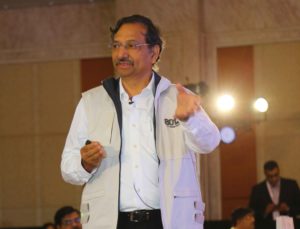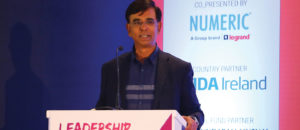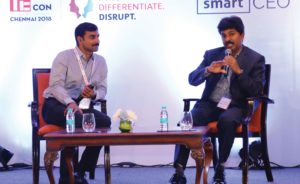Earlier this month, we conducted the inaugural edition of Leadership Unplugged, a digital and events platform dedicated to the topics of leadership and decision-making. For us at Smart CEO, the event, which was held on September 6 and 7, 2018 at Taj Coromandel, Chennai, was two more days of phenomenal learning from some of India’s finest first-generation entrepreneurs, family business leaders and professionals CXOs.
While the October 2018 edition of the magazine will include a detailed coverage of all the talks from the conference, in this piece, we highlight 7 Ideas on Decision Making that stood out for us from Leadership Unplugged.
#1 The Follower Strategy

One of the highlights of the event was a hour-long workshop on the topic ‘Applying Design Thinking to Leadership’ delivered by Arun Jain, Founder & Chairman of Intellect Design Arena. Jain had the 250-strong listeners in the audience on their toes, quite literally. He kickstarted the workshop by requesting the entire audience to standup and form a circle spanning the entire circumference of the Ball Room, holding hands with each other to transfer positive energy from one to another. As the workshop began, he had the complete attention of the audience. There were ideas, strategies and tactics that were shared, but here, we highlight one that stood out.
For entrepreneurs, especially those starting a business for the first time, the ideal approach is to differentiate the product or service offering as much as possible. But, Jain highlighted the strategy adopted by Samsung. While Apple was scaling its business rapidly by launching highly unique, premium products, Samsung was remarkably good in adopting the ‘follower strategy’. It reverse engineered all of Apple’s products, yet did really well in terms of distribution, service quality and brand. From a pricing perspective, it wasn’t too far behind and was able to command a premium in the marketplace. Flipkart did the same with Amazon.com.
The Takeaway: If you’re a follower, implement and execute really well. Only strategy can be copied, not the execution. And, do not hesitate to adopt a follower strategy, if your organization’s DNA demands that.
#2 If a Decision makes sense to you, Take it Quickly

Venky Rajgopal, Founder & Chairman of Indian Terrain narrated the story of how in the early days of Brand Indian Terrain, he partnered with the Times Group’s Private Treaties program. It was an opportunity for Rajgopal to create awareness for the Indian Terrain brand without paying in cash, but parting with equity. A number of Rajgopal’s colleagues and well-wishers apparently questioned the need to part with hard-earned equity which would be a great value later on. At the time, the Times Group’s Private Treaties Program was also extremely new in the market and entrepreneurs weren’t sure how it would work out in the long run.
Yet, for Rajgopal, it solved a problem. Brand awareness was the key to scale and he didn’t have the cash flow to support big ad budgets. The decision made sense and he took it.
In hindsight, Rajgopal says it was one of the best decisions he made. It helped him establish presence through Indian Terrain outlets across India. And, thanks to Times of India’s reach, brand awareness was not a problem.
The Takeaway: If you’re convinced about a decision, take it, and make it work. Decisions cannot be taken with all the data in place. An entrepreneur has to move quickly.
#3 Do you have Absolute Belief in your business, your offering?

This one may sound like a soft point, but is absolutely critical. Murugavel Janakiraman, Founder & CEO, Matrimony.com during his fireside chat with Srikanth Narasimhan, Founder & Director, Veda Corp, highlighted the need for leaders to have absolute belief in their business, their idea, their product.
Muruga, as he’s popularly known, spoke about an experience he had when Matrimony.com was raising its first ever round of institutional funding in late 2015. Apparently, Srikanth called Muruga on Jan 1, 2006 to give him some bad news. Srikanth called and just said, “Muruga, we’ve run out of options. I don’t think we’ve left out any investor. All of them have said NO to invest in your venture.” It was apparently one of Muruga’s most difficult days. Yet, he went to work, in spite of it being a holiday, and got things done. He evaluated the company’s financials and decided to bootstrap a little longer. Additionally, he would keep trying to raise money, addressing head-on the feedback given by investors who had said no.
Within the next fortnight, Yahoo, at that time a Silicon Valley biggie, wanted to come on board as a strategic investor. Veda Corp’s Srikanth urged Muruga to take the meeting, very well knowing that Muruga wasn’t keen on a strategic investor. He was an entrepreneur, and his goal was to remain independent.
Muruga & Srikanth convinced Yahoo to come on board as a financial investor and Canaan Partners also came onboard the Series-A round of US $8.65 million in mid 2006.
The Takeaway: Muruga says one of the biggest takeaways from this experience was to retain absolute belief in one’s business. If you, as an entrepreneur, are not convinced, it is very difficult to convince investors. In the end, it was this belief that made the difference. Keep pitching, keep listening, keep tweaking, but remain absolute in your belief. Your narrative may change, but an investor will know when you don’t believe in your own offering.
#4 The ‘What Next?’ Question

On Day 2 of Leadership Unplugged, Daniel Raj David, CEO and Co-Founder at Detect Technologies (Detect), joined us for a panel discussion on Early Stage Leadership. David, is all of 23-years-old, having graduated from high-school in 2012 and then from IIT-Madras in 2017. And, he founded Detect while he was in his second year at IIT. The inspiration for the startup came from numerous pipelines leaks and associated accidents in the oil and gas industry. David had the idea to build an IoT-based product capable of monitoring pipeline integrity at extremely high temperatures. Today, of course, Detect has two products; One, called GUMPS for pipeline monitoring (his original idea); Two, called NOCTUA an intelligent industrial drone, tailor built to inspect industrial structures, through machine learning techniques. Detect has raised capital from Shell, Axilor Ventures and counts Reliance Industries as a client.
The moderator asked David a very direct question: “A couple years back you were a student at IIT. Today, you’ve won an ET Startup Award, you’ve Shell as an investor in your company and you managed to clinch Mukesh Ambani’s Reliance Industries as a customer. How did this happen? Did you plan all this?”
David’s first response was simple this: “It was a fluke.”
Then, he went on to elaborate how all this panned out. David narrated the story of how he worked closely with an IIT-Madras Prof. Krishnan Balasubramaniam, and that research work laid the foundation for Detect. At the time, he also had a senior who had got a job at Reliance Industries. Through him, David along with his classmates (now co-founders) managed to get through to Nikhil Meswani, an Executive Director at RIL and Mukesh Ambani’s cousin. Meswani was apparently excited to see two young college students attempt to solve a major, real problem they faced regularly at RIL. He sanctioned a grant of Rs. 60 lakh to IIT-Madras, to allow these students to pursue their research. And, that was the beginning of Detect. David was thrilled to build this up and convert a college research project into a startup. He stuck posters all around IIT-M, inviting students to join his startup.
The Takeaway: From this experience, the big take away we have for upcoming leaders is a simple one. Ask, ‘what next’ and get it done. While this wasn’t explicitly mentioned by David, it is exactly what he did. He spotted an opportunity to solve a problem faced by the Oil & Gas industry. He took it upon himself to conduct research. Next, he had to build a product, which needed some money. He managed to connect to the very top of RIL and clinch a grant. Next, was to take the plunge and convert this research project into a startup. For our readers, the lesson is simply this: Ask what next, and get it done.
4 Key Takeaways
“If you’re a follower, implement and execute really well. Only strategy can be copied, not the execution.”
“If you’re convinced about a decision, take it, and make it work. Decisions cannot be taken with all the data in place.”
“Keep pitching, keep listening, keep tweaking, but remain absolute in your belief. Your narrative may change, but an investor will know when you don’t believe in your own offering.”
“For our readers, the lesson is simply this: Ask what next, and get it done.”